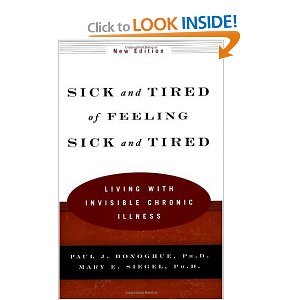Sick and Tired of Feeling Sick and Tired: Living with Invisible Chronic Illness, Second Edition
Paul J. Donoghue (Author), Mary Elizabeth Siegel (Author)
Review
An invaluable source of help and comfort to those who suffer from invisible chronic illness and to their caregivers and friends. — Katharina Dalton, M.D.
How many times have you said to yourself, ‘No one can understand how I feel unless they’ve experienced it themselves?’ Because the authors of this book each have experienced an ‘Invisible Chronic Illness’ or ICI, they are able to express feelings that you have more than likely experienced but have not been able to put into words. This book validates your emotions and then helps you to express them in constructive ways. — Network
One of the most helpful books about chronic illness that I ever run across….This book is captivating, informative, and sensitive. — Allergy Aware
This self-help book by two Ph.D. psychologists (one of whom suffers from multiple sclerosis) is not new, just new to me, and what a discovery! It is a moving explication of what it means to live with an invisible chronic illness–ICI. If you have patients, acquaintances or if you yourself suffer from an ICI you can find valuable advice and guidance in this book. — Ostomy/Wound Management
Product Description
Unlike a leg in a cast, invisible chronic illness (ICI) has no observable symptoms.
Consequently, people who suffer from chronic fatigue, chronic pain, and many other miseries often endure not only the ailment but dismissive and negative reactions from others. Since its first publication, Sick and Tired of Feeling Sick and Tired has offered hope and coping strategies to thousands of people who suffer from ICI. Paul Donoghue and Mary Siegel teach their readers how to rethink how they themselves view their illness and how to communicate with loved ones and doctors in a way that meets their needs. The authors’ understanding makes readers feel they have been heard for the first time.
For this edition, the authors include a new introduction drawing on the experiences of the many people who have responded to the book and to their lectures and television appearances. They expand the definition of ICI to include other ailments such as depression, addiction, and obsessive-compulsive disorders. They bring the resource material, including Web sites, up to the present, and they offer fresh insights on four topics that often emerge: guilt, how ICI affects the family, meaningfulness, and defining acceptance.
Click here to learn more about this book or get your own copy on Amazon.










